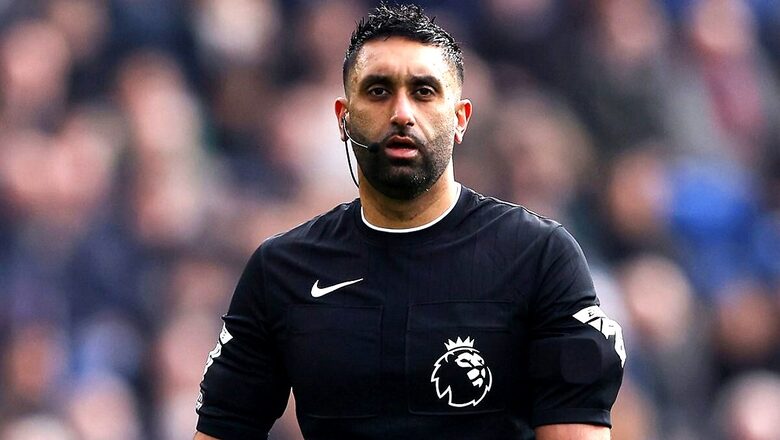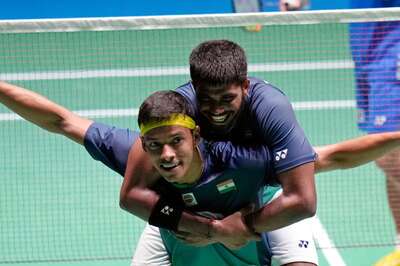
views
Sunny Singh Gill was standing at the proverbial career crossroads one year ago. He had the option to continue as a prison officer or concentrate on carrying forward his family’s rich footballing legacy by chasing his refereeing dream.
Cut to 2024, the 39-year-old scripted history at Selhurst Park on Saturday when he became the first Indian-origin and British South Asian to referee in an English Premier League fixture (Crystal Palace vs Luton).
Crystal Palace were held to a 1-1 draw by Luton Town.
Earlier this week, British PM Rishi Sunak, while addressing an awards ceremony organised by the Asian Media Group (AMG), had said: “This weekend I’ll be proud to see Sunny Singh Gill taking to the pitch as the first South Asian to referee a Premier League match,” “It is a reminder of the incredible contribution of South Asian people to our economy and our society. It’s a reminder too of the values we share: hard work, family, education and enterprise. There is so much for us to celebrate,” he said.
It is not the first time that a member of the trailblazing Gill family claimed a slice of history though. Sunny’s father Jarnail Singh was the first turbaned referee in the history of English League football (EFL). He officiated 150 matches between 2004 and 2010.
“Football has always run in the family,” Sunny said.
His brother Bhupinder was the first Sikh-Punjabi to serve as a Premier League assistant referee when he ran the line during the Southampton versus Nottingham Forest game last year.
“Me and my brother grew up loving the game and like most young kids, we just wanted to play but in our household, it was a bit different because when we were going to primary school, we knew our dad was going out to referee on a weekend,” he told EFL last year.
“There were times he was a fourth official in the Premier League and our friends would say they saw him on Match of the Day!” But it was not refereeing that he dreamed of as a child. Like umpteen children in Britain, Sunny too aspired to play football professionally.
“I remember when I was nine years old we went to watch Arsenal play Everton, that was our first Premier League game,” Sunny said. “Dermot Gallager was the referee and dad was the fourth official. At that age you don’t really think about being a referee.
“I remember looking around Highbury and watching Ian Wright for Arsenal thinking, ‘wow, this is what I want’. “We took a picture on the pitch underneath the goalposts and all I thought about was how amazing it would be to score a goal there, not give a penalty there or something!” He was scouted by Queens Park Rangers but was released soon after the trials at the club’s youth academy. But his passion for football remained intact.
It wasn’t until watching his father referee a game between Wolves and Burnley in front of 35,000 fans that Sunny understood what his calling was.
“After watching him walk out of the tunnel that day that’s when I thought, ‘yeah, I want to be a referee’. I was a little bit older and more realistic and I knew what it was like to go through that matchday routine as a referee.” At 17, Sunny took charge of his first Sunday League. But the teenager found it difficult to handle footballers on the field and went on a five-year hiatus from officiating. “I got put off it. Part of it was because I wanted to play football with my friends, but also I was only 17 and refereeing was hard.
“Players behave in a certain way, I was young, perhaps a little bit immature and I didn’t have the man-management skills to cope with that.” An encouraging chat with his father put him back on the path of refereeing.
In April 2021, Sunny (fourth official) and Bhupinder (assistant) became the first pair of British South Asians to officiate in the same Championship match and in November last year, he became the first South Asian since his father to referee a Championship game.
Alongside officiating in the EFL, Sunny also worked at Feltham Prison and Young Offender Institution. Fatigued, he eventually gave up the latter to focus on training as a referee.
“It was tough, doing full-time shift work during the week then going off officiating at the weekends, you have to think how it will affect your life but I knew it was what I wanted to do.
“I asked my family to just stick with me because I knew it would be worthwhile one day when I could have a professional career in football and I did.” It hasn’t been an easy journey for Sunny who realised his Premier League dream on Saturday and wants to scale greater heights.
“It’s been a lot of hard work training away from the pitch, improving in every department with the help of the PGMOL and my coaches.


















Comments
0 comment